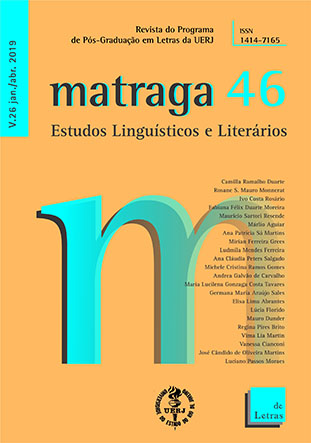In a land far, far away: writing (in) French Polynesia
DOI:
https://doi.org/10.12957/matraga.2019.37109Keywords:
French Polynesian literature, Mā’ohi literature, colonial literature, FrancophonieAbstract
This article approaches, from a historical perspective, the contemporary literature of French Polynesia and the themes that are particular to it, a consequence of the complex relationship between the region and France. The first text about Tahiti dates back to the 18th century when the explorer Antoine de Bougainville disembarked on the island. The publication of his diary in 1771 marks the origin of a myth that promises, to this day, the possibility of an earthly paradise. Over the years, the Tahitian mirage was consolidated, eventually assimilating the 118 islands that make up French Polynesia and overcoming the singularities of each one of them. However, with the onset of 193 atomic detonations in the region (carried out by the French government between 1966 and 1996), the environment became conducive to the birth of the movement aimed at restoring ancestral languages and cultures. Instead of stories written by foreign authors about French Polynesia, native writers decided to take control of the narrative, which proposes to reflect the Mā’ohi identity as it exists within the context of living under the rule of France. Today, this literary body, more substantial and prominent as the cultural revolution grew in scope, is regarded by academics as the youngest in the world. If books in print still face intellectual prejudices and high costs, the internet has created copious opportunities for publishing online, allowing local authors to transcend the insularity that has limited them for centuries.
---
Original in English.
Downloads
Downloads
Published
How to Cite
Issue
Section
License
Authorization
Matraga – Scientific Journal of the Post-graduate Program in Arts and Humanities of UERJ is authorized to publish the article submitted here, if it is accepted for online publication. It is attested that the contribution is original, that it is not being submitted to another publisher for publication, and that this statement is the expression of truth.
The works published in Matraga's virtual space – Scientific Journal of the Post-graduate Program in Arts and Humanities of UERJ will be automatically transferred, and your copyright is reserved to Matraga. Its reproduction, in whole or in part, is conditional on the citation of the authors and the data of the publication.

Matraga uses license Creative Commons - Attribution-Non-Commercial 4.0 International.





